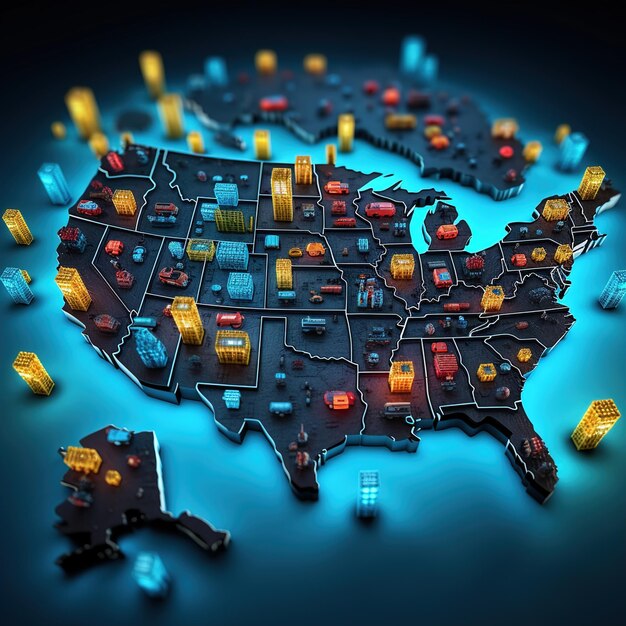Interstate Commerce Regulations: What’s Changing in 2025?

Anúncios
Breaking: New Regulations on Interstate Commerce Set to Take Effect January 2025 – What You Need to Know encompasses significant updates impacting businesses that operate across state lines, compelling them to understand and adapt to new compliance standards to avoid penalties and maintain smooth operations.
Get ready for a major shift in how businesses operate across state lines! Breaking: New Regulations on Interstate Commerce Set to Take Effect January 2025 – What You Need to Know about these upcoming changes, their potential impact on your business, and how to prepare for a seamless transition.
Anúncios
Understanding the Scope of Interstate Commerce Regulations
Interstate commerce regulations govern the movement of goods, services, and people across state lines. These regulations are crucial for ensuring fair trade, protecting consumers, and maintaining a level playing field for businesses nationwide. The upcoming changes in 2025 reflect a modernization effort to address evolving business practices and technological advancements.
Understanding the scope of these interstate commerce regulations is vital for businesses of all sizes. Non-compliance can lead to severe penalties and legal repercussions. This section delves into the key areas affected by these new regulations.
What activities are deemed interstate commerce?
Any business activity that involves crossing state lines, either physically or digitally, typically falls under the umbrella of interstate commerce. This includes transportation of goods, online sales to customers in other states, and even services provided remotely across state lines.
Why are these regulations necessary?
Anúncios
Interstate commerce regulations establish a consistent legal framework for businesses operating in multiple states. This reduces confusion, prevents unfair competition, and safeguards consumer rights across state lines. It fosters a stable and predictable business environment.

To gain a deeper understanding, consider the following points related to necessary regulations:
- Protecting consumers from fraudulent or unsafe products sold across state lines.
- Ensuring fair competition among businesses, preventing monopolies and anti-competitive practices.
- Establishing uniform standards for product safety and labeling, regardless of the state of origin.
- Streamlining the processes for interstate transportation and logistics.
In conclusion, the scope of interstate commerce regulations is broad and touches upon many aspects of business operations. Understanding these regulations is the first step toward ensuring compliance and avoiding potential legal issues.
Key Changes Coming in January 2025
The new regulations set to take effect in January 2025 introduce significant changes to interstate commerce. Businesses need to understand these changes to adapt their operations and remain compliant. This section outlines the most critical updates and their potential implications.
These changes have far-reaching implications, and understanding them is crucial for businesses operating across state lines. Let’s delve into some of the most significant updates:
Updates to shipping and transportation standards
The new regulations impose stricter standards on the transportation of goods across state lines. This includes updated requirements for vehicle safety, driver qualifications, and cargo security. Businesses must ensure their logistics operations comply with these enhanced standards.
Revised rules for online sales and taxation
Online retailers will face revised rules concerning sales tax collection and reporting for interstate transactions. Businesses must accurately calculate and remit sales taxes based on the destination of the goods, requiring more sophisticated accounting systems. These may also include rules on data privacy.
To fully grasp the impact, consider the following list of critical changes:
- Stricter enforcement of environmental regulations for businesses involved in interstate transportation.
- Updates to labor laws affecting employees who work across state lines.
- Changes to consumer protection laws, including clearer disclosure requirements for online sales.
- New cybersecurity standards for businesses handling sensitive data in interstate transactions.
In summary, these key changes coming in January 2025 signal a need for businesses to take proactive measures to ensure compliance. This section has highlighted the most important updates to stay informed about.
Impact on Different Industries
The new interstate commerce regulations will have varying impacts on different industries. Some sectors will face more significant challenges than others, depending on their business models and reliance on cross-state activities. This section examines how specific industries may be affected.
It’s important to recognize that these new regulations won’t affect all industries equally. Some sectors may experience a greater impact due to their specific operations and reliance on interstate activities.

Manufacturing
Manufacturers who ship products across state lines will need to comply with stricter transportation and labeling requirements. This may require investments in new equipment and training for employees. Additionally, the increased costs could affect pricing strategies.
E-commerce
Online retailers will grapple with the complexities of collecting and remitting sales taxes in multiple states. Compliance with evolving data privacy laws is a key concern, particularly for businesses that operate nationally. They risk facing potential legal challenges and reputational damage if compliance is mishandled.
The following list details how specific industries might be impacted:
- **Agriculture:** Changes to interstate transportation regulations could affect the movement of crops and livestock, potentially increasing costs for farmers.
- **Transportation:** New rules for truck drivers and vehicle maintenance will necessitate substantial investments in upgrading fleets and staff training.
- **Financial Services:** Institutions providing services across state lines will face stricter compliance requirements related to consumer protection and data security.
In conclusion, the impact of these regulations will vary across industries, with some facing more significant changes than others. Businesses should carefully assess their operations and prepare for the specific challenges that lie ahead.
Preparing Your Business for Compliance
Preparing your business for compliance with the new interstate commerce regulations is essential to avoid potential penalties and disruptions. This section provides practical steps to ensure your business is ready for the changes taking effect in January 2025.
To ensure a smooth transition, businesses should take proactive steps to prepare for compliance. Here are some key actions to consider:
Conduct an internal audit
Assess your current operations to identify areas that may be affected by the new regulations. This includes reviewing transportation practices, sales tax procedures, and data security protocols. Identify any gaps in your compliance efforts.
Seek expert advice
Consult with legal and compliance professionals to gain a clear understanding of the new regulations and their specific implications for your business. Lawyers and consultants can offer valuable guidance and support in developing a compliance strategy.
Take note of the following checklist to guide your compliance efforts:
- Update your accounting systems to accurately calculate and remit sales taxes for different states.
- Provide training to your employees on the new transportation and safety regulations.
- Implement robust cybersecurity measures to protect sensitive data from breaches.
- Review and update your company policies to reflect the latest regulatory requirements.
In short, preparing your business for compliance with the new interstate commerce regulations requires a proactive and comprehensive approach. Stay informed, seek expert advice, and take the necessary steps to ensure a seamless transition.
The Role of Technology in Compliance
Technology plays a crucial role in helping businesses navigate the complexities of the new interstate commerce regulations. This section explores how technology solutions can streamline compliance efforts, reduce errors, and enhance efficiency.
In today’s digital age, technology is invaluable for businesses trying to navigate the intricacies of interstate commerce regulations. Let’s explore how different technological solutions can assist in compliance:
Automation tools for sales tax compliance
Automated sales tax software can streamline the process of calculating, collecting, and remitting sales taxes for online transactions. These tools integrate with e-commerce platforms and accounting systems, reducing the risk of errors and ensuring compliance with state and local tax laws. This can save time and resources.
Transportation management systems
Transportation management systems (TMS) can help businesses manage their logistics operations more efficiently. TMS software can track shipments, optimize routes, and ensure compliance with transportation regulations, such as driver hours-of-service rules and vehicle safety standards. By reducing complexity, there is less room for error.
Here are a few potential technological solutions to consider:
- **Data Analytics:** Employ data analytics tools to monitor compliance efforts and identify potential areas of risk.
- **Cybersecurity Software:** Invest in robust cybersecurity solutions to protect sensitive data and comply with data privacy regulations.
- **Cloud-Based Solutions:** Utilize cloud-based platforms for collaboration, document management, and data storage to ensure compliance across distributed teams.
In summary, technology offers a range of solutions to help businesses comply with the new interstate commerce regulations. Implementing the right technology can streamline operations, reduce errors, and improve overall efficiency.
Resources for Staying Informed
Staying informed about the evolving landscape of interstate commerce regulations is an ongoing process. This section highlights valuable resources that businesses can use to stay up-to-date on the latest changes and best practices.
To effectively navigate these evolving regulations, businesses need access to reliable and up-to-date information. Here are some resources to help you stay informed:
Government websites
The websites of federal agencies, such as the Department of Commerce and the Federal Trade Commission, provide valuable information on interstate commerce regulations. Check these sites regularly for updates, announcements, and guidance documents. These will offer vital insight and foresight.
Industry associations
Industry associations often provide members with access to resources, training, and advocacy efforts related to interstate commerce regulations. Joining an industry association can help you stay informed and connected to other businesses in your sector. This fosters education and support.
Consider these various resources to remain informed:
- **Legal Newsletters:** Subscribe to legal newsletters and publications to receive updates on changes to interstate commerce laws.
- **Webinars and Seminars:** Attend webinars and seminars hosted by legal experts and industry professionals to learn about best practices for compliance.
- **Online Forums:** Participate in online forums and discussion groups to share information and insights with other businesses.
To conclude, staying informed about interstate commerce regulations is vital for businesses operating across state lines. Utilize these resources to keep abreast of the latest changes and best practices in the field.
| Key Point | Brief Description |
|---|---|
| 🚚 Updated Shipping Standards | Stricter transport rules effective Jan 2025. |
| 💰 Revised Online Sales Tax | New rules for collecting sales tax across states. |
| 📊 Compliance Audit | Assess operations for regulatory compliance gaps. |
| 💻 Tech for Efficiency | Use tech to streamline and automate processes. |
FAQ
▼
Interstate commerce refers to the trade, transport, or exchange of goods, services, or money across state lines. It’s regulated by the federal government to ensure fair and consistent practices affecting all businesses.
▼
The breaking: new regulations on interstate commerce set to take effect January 2025 – what you need to know. All businesses that operate across state lines should be aware of this date.
▼
Any business involved in the movement of goods, services, or information across state lines, including online retailers, manufacturers, transportation companies, and financial institutions, will be affected.
▼
Penalties for non-compliance can range from fines and legal sanctions to operational disruptions and damage to reputation, depending on the severity and nature of the violation.
▼
You can find more information on official government websites like the Department of Commerce and Federal Trade Commission, as well as through industry-specific associations and legal publications.
Conclusion
As January 2025 approaches, businesses must prioritize understanding and preparing for the new interstate commerce regulations. By conducting internal audits, seeking expert advice, and leveraging technology, businesses can ensure a seamless transition and maintain compliance in the evolving regulatory landscape.